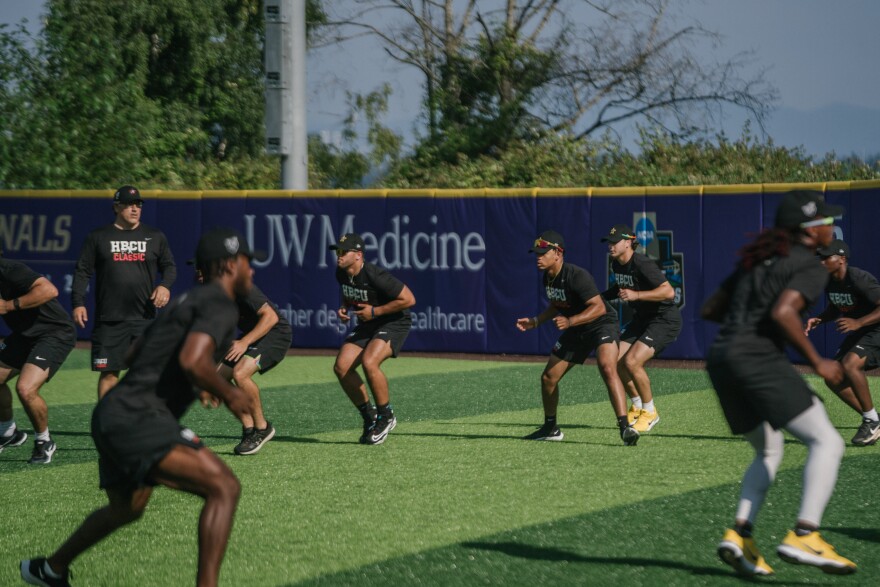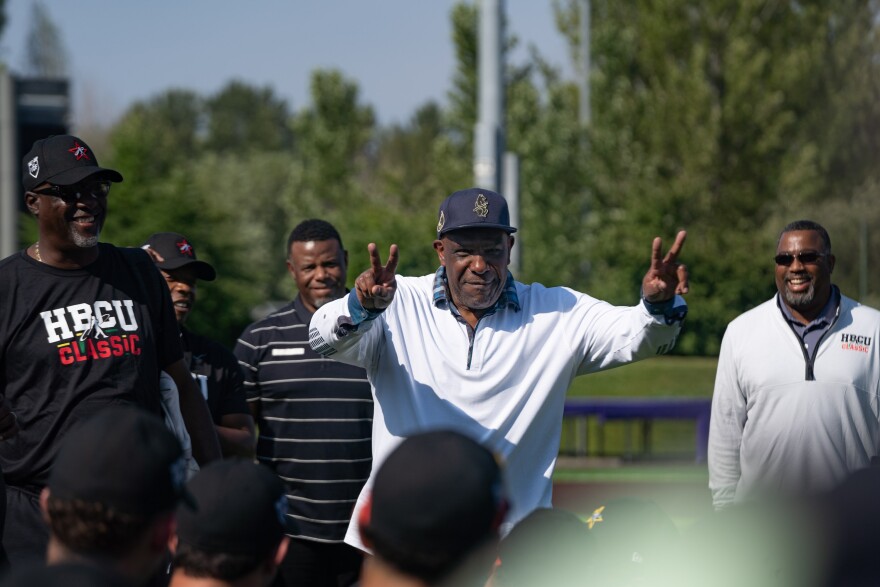Growing up in Queens, N.Y., Mike Dorcean would pick up a baseball bat and imitate Ken Griffey Jr.'s swing.
Last Friday, July 7, the 22-year old catcher for Coppin State University kicked up dirt in the same dugout with The Swingman himself.
Griffey hasn't returned from retirement, but last weekend, he was back on the field in Seattle – where he spent the bulk of his Hall of Fame career – with Dorcean and 49 other college baseball players. The occasion: the inaugural HBCU Swingman Classic, an exhibition game kicking off Major League Baseball's All-Star Week.

The event was Griffey's brainchild with support from the MLB-MLBPA Youth Development Foundation. The idea was to create a national stage where scouts and other power-players in the sport could watch promising young athletes from historically Black colleges and universities – like Dorcean.
"This is such a great stepping stone to get the minority community back into baseball," Dorcean said. "You don't really see too many African-American or Black athletes in baseball – it makes up one of the lowest percentages."
Black representation in MLB is at its lowest point since data were first collected in 1991, when the league was around 18% Black. Now, only 6.2% of the league is made up of Black players.

That isn't lost on fans and historians who note that baseball led the way on U.S. racial integration not only in professional sport – but across the nation.
"Jackie Robinson's breaking of the color barrier in 1947 wasn't just a part of the civil rights movement – it was actually the beginning of the civil rights movement in this country," says Bob Kendrick, president of the Negro Leagues Baseball Museum.
That was 76 years ago, and it took over a decade more for the league to fully integrate. Now, the complexion of the game has changed again.
The 2022 World Series was played without a single American-born Black player for the first time in its history. On this year's opening day, there were no HBCU alumni on an MLB roster.

It was difficult to imagine that reality if you stood in the bleachers at Seattle's T-Mobile Park last weekend. Nearly everyone at the Mariners' ballpark – from the field, to the dugout, to the crowd – was Black.
For the organizers of this game, including Ken Griffey Jr., this kind of atmosphere and exposure for HBCU players was exactly the point.
"When you go to the lower-tier colleges, they're out there because they love the game, because they're not being seen like they should be," Griffey said. "They're not getting the exposure, like everyone else. And so they love the game differently than someone who's just good at it."
Traditions and Economics
Ken Griffey Jr. comes from a legacy of professional baseball. His father Ken Griffey Sr., himself a three-time All-Star, was at the weekend's events too, dressed in his very own "HBCU"-branded baseball uniform. His son said his father has spent his life helping young, aspiring players. "He's done it and so now it's my turn," Griffey Jr. said.
Griffey Jr. and Dorcean share that in common — they both inherited a love of baseball from their fathers. Dorcean can't even remember when he first started playing the game. "My first birthday was a picnic at Yankee Stadium," he said.

Dorcean's parents both came from working-class backgrounds – his father's family immigrated to the U.S. from Haiti; his mother's family, from Puerto Rico. Eric Dorcean, Mike's dad, said he worked multiple jobs at a time in his youth, and couldn't pursue professional baseball himself. It's become his dream for his son — a dream Mike doesn't take lightly.
"Seeing [my dad] make so many sacrifices to give me the opportunities I've had throughout baseball – all I want to do is hopefully give back to him by making it as far as I can," Dorcean said.
Despite Eric's pride in his son, he recognizes that many minority athletes do not have the resources to invest in playing a game he knows is increasingly expensive. He was a travel baseball coach.
"The good travel teams – their parents had a lot of money," Eric Dorcean said. "They were being coached since they were 5 years old, so they're going to be good." Many Black and minority athletes, he said, don't have that kind of access.

This economic disparity is at the heart of why many who know the sport say it's losing Black players.
"Today, American baseball is very expensive," says Howard Bryant, a longtime sports reporter and NPR contributor. "It's a travel sport. The equipment is expensive, the travel is expensive. It's become more professionalized than ever. So instead of people playing sandlot baseball, baseball is a very industrialized sport now. That changes who gets to play."
Bryant thinks the problem is systemic and starts at the youth level, continuing into college baseball, where he says diversity is "virtually nonexistent." According to the most recent NCAA data, about 4% of baseball players were Black in 2022.
"So if this is going to be the source of your talent, then what is your game going to look like? Your game is going to look like the feeder systems where you're getting your players," Bryant says.
Hall of Fame outfielder Andre Dawson, who served as one of the coaches for the Swingman Classic, also suggested cultural factors. The tradition of "the game itself was lost," he said, in part because of the draw of other popular sports like basketball and football.

Tony Reagins, Chief Baseball Development Officer and the highest-ranking Black executive at MLB, does not necessarily agree that Black youth are playing the game less.
"The narrative is easy to say: they're not playing because you don't see it at the major league level," Reagins says. He points to elite coaching and training programs backed by MLB that are aimed at minority baseball players, but admits: "We need to do a better job as a league at marketing [those programs]."
Reagins also recognizes the economic barriers for minority players trying to get into the major leagues, and admits there's "definitely" more work to do. But he sees a brighter future.
He says he spends a good deal of his time around "young Black players who are really good" who he foresees coming to MLB. "I just think there's going to be a pipeline we're building that's going to be sustained for years to come," Reagins says.
Bob Kendrick of the Negro Leagues Baseball Museum agrees: "So we've got to be patient and baseball is investing in the way that it should. I believe we will see the pendulum start to shift slowly but surely as we see more Black players in the minor leagues."
Play Ball
The sky was still bright in Seattle last Friday evening as the stadium lights flickered on for the Swingman Classic. Griffey Jr., Dawson, and other former pros involved in the sport were honored, some throwing out the ceremonial first pitches. A Black choir sang "Lift Every Voice and Sing," also known as the Black national anthem, and a local drumline decked out in purple and silver uniforms performed throughout much of the night.

The 50 players had been divided into two teams to play a full game, and Dorcean finally got his turn in the bottom of the seventh inning. He ran on as catcher, and came up bat in the top of the eighth. He connected to launch a high fly ball – but it was snagged by an opposing outfielder, and Dorcean jogged off the field. He stayed in at catcher for the rest of the game.
Dorcean's team ultimately prevailed 4-3. But it was clear, even from the stands, that the final score had little importance for the players on the field, who all wore jerseys with the letters "HBCU" across their chests. Dorcean and two fellow teammates from Coppin State found each other and posed for photos as fireworks erupted overhead. Dorcean even signed baseballs for young fans through the netting.

But he kept turning his head over his shoulder, looking for one person: his father. Eric Dorcean appeared in the crowd, tears in his eyes. He hadn't planned to be there, but made a last-minute decision to fly in that morning from New York to see his son play.
"This is the man that made my career happen," said the younger Dorcean.
When asked about the sacrifices he made for his son, Eric Dorcean simply said: "It isn't a sacrifice – it's our obligation."
The day after he flew home from Seattle to New York, Mike Dorcean was off again – this time to summer ball in Wisconsin. After four years at Coppin State, he's looking to take advantage of one more year of NCAA eligibility, and then hopes to be drafted by a Major League team.

"Hopefully the cleats aren't getting hung up in the next few years," he said.
But if his pro career doesn't work out, he plans to return to Queens and continue training young, aspiring baseball players at a local gym where he's worked for a couple of summers.
"All I want to do is play this game the right way and to show other kids to play the game the right way," he said.
Copyright 2023 NPR. To see more, visit https://www.npr.org.







